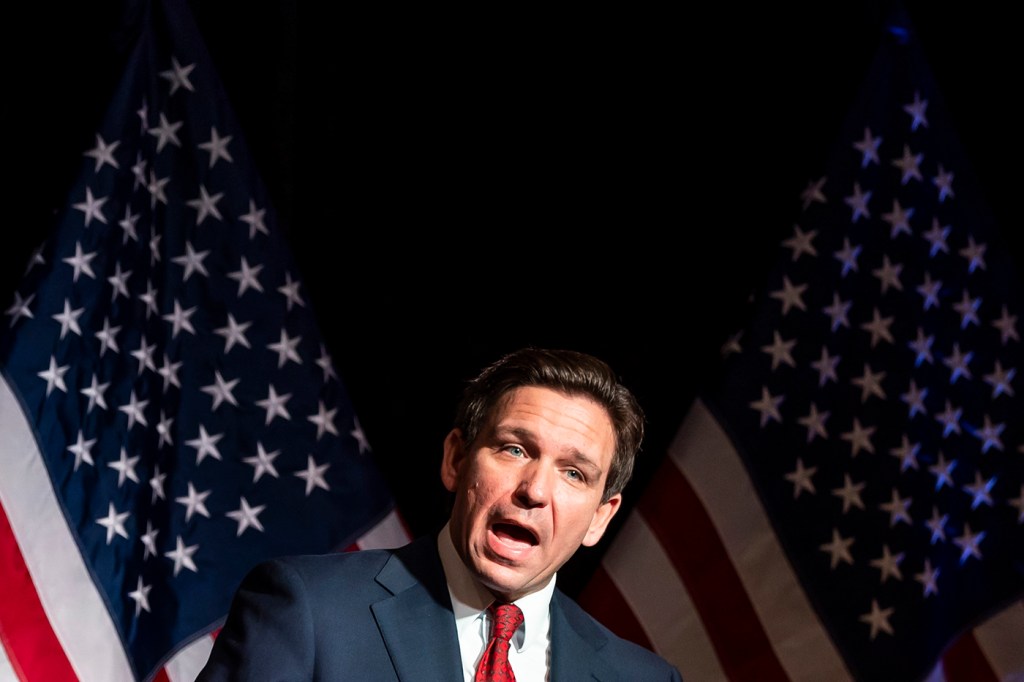Is Ron DeSantis’ war against Disney a campaign killer for the presidential hopeful?

As Florida Gov. Ron DeSantis prepares to announce his run for the presidency in 2024, he may have an opponent more formidable than Donald Trump: Mickey Mouse.
DeSantis has been waging a year-long war against the Walt Disney Corporation since the company, which has operated Walt Disney World in Orlando since 1971, rebuked the “Don’t Say Gay” bill in March 2022.
For now, Disney seems to have the upperhand, turning the tables on DeSantis’ attempt to wrestle control of its Florida property away from the company. But DeSantis is not backing down, and it’s caused some to wonder if his commitment to fighting the culture wars and one of the most powerful corporations in the world might kill his campaign before it’s even started.
“If you’re going to attempt a strategy as risky as this, it needs to be pulled off seamlessly and so far it hasn’t,” says Costas Panagopoulos, chair of Northeastern University’s political science department and distinguished professor of political science. “There is a chance it could backfire because now he’s on the defensive and he might have to take more extreme measures that he wasn’t initially planning to take in order to stay ahead of this situation––if that’s even possible. If the perception that he’s been outwitted by Disney calcifies in the electorate, the political points he was hoping to score may evaporate.”

The battle between DeSantis and Disney has been a convoluted bout of legal and political judo that has left DeSantis worse for wear, he says.
Tensions between the company and DeSantis started back in March 2022 when the typically politically tightlipped company spoke out against a Florida law dubbed by critics as the “Don’t Say Gay” bill. The legislation, signed into law by DeSantis, bars discussion of sexual orientation or gender identity in kindergarten through third grade and severely limits it beyond third grade.
In response, DeSantis, who has built a successful political career on culture war issues, lashed out at what he calls “Woke Disney.”
He started by trying to limit Disney’s authority over the special tax district that Walt Disney World occupies. The Reedy Creek Improvement District is an “independent special district” that allows the theme park to function like a county government. It has full control over planning, permitting and construction on the property, including roads and other infrastructure. It can maintain its own water and electrical services and has its own police and fire departments.
DeSantis and the Florida legislature attempted to revoke the company’s special tax status––until they realized it would mean shifting about $1 billion in debt to residents in neighboring counties.
The governor then shifted his attention to the special tax district’s five-member oversight board. In February 2023, DeSantis signed a bill that gave the governor the authority to replace the previously Disney-appointed board with a hand-picked selection of Florida Republicans.
“Today, the corporate kingdom finally comes to an end,” DeSantis said. “There’s a new sheriff in town and accountability will be the order of the day.”
But a month before the new board started, the outgoing board approved an agreement during a public meeting that restricted the board’s ability to make changes to the property without Disney’s approval, defanging DeSantis’ new board in the process. To cap it all, using a Royal Lives Clause, a legal mechanism used in the U.K. and former British colonies, the board also ensured the agreement would remain in effect until 21 years “after the death of the last survivor of the descendants of King Charles III, King of England.”
By the time DeSantis and his appointed board realized what had happened it was too late. Meet the new sheriff, same as the old sheriff.
“You better be sure you’re going to kill the king if you choose to attack him,” Panagopoulos says. “I don’t think in this situation DeSantis has wounded Disney in any meaningful way. All it does for DeSantis is create a very powerful enemy that could cause lots of problems for him down the road.”
DeSantis is now calling for an investigation into the agreement, while Disney maintains that “all agreements signed between Disney and the District were appropriate, and were discussed and approved in open, noticed public forums in compliance with Florida’s Government in the Sunshine law.” Bob Iger, chief executive of the company, also confirmed the company’s ongoing investment in Florida, citing plans to pump $17 billion into Walt Disney World over the next decade and bring in 13,000 new jobs.
Panagopoulos says DeSantis’ decision to pick a fight with Disney is, in a way, an attempt to position himself as an alternative to Trump. With the former president facing legal challenges, DeSantis took a page from the Trump playbook and made a play to the Republican base in his attempt to “demonstrate strength and ruthlessness.”
There’s inherent risk with a kind of strategy where execution and follow-through are less important than political posturing. The risk is even more significant when the target is a company with considerable economic sway in your home state. Disney’s 25,000-acre megaresort has brought tens of thousands of jobs and billions of dollars in economic benefits to the state. In this case, it’s not just a culture war; it’s an economic war.
“At the end of the day people’s pocketbooks matter to them more than politics,” Panagopoulos says.
DeSantis has started to trail even further behind Trump in preliminary polling. Being known as “the guy who lost in a fight with Mickey Mouse” won’t help, Panagopoulos says, and it could start to “recast [his] image in the minds of many voters,” especially if his political opponents leverage it.
Panagopoulos says DeSantis’ power play against Disney also might be a sign of things to come for a Republican party that continues to double down on culture war politicking.
“Efforts like these are inconsistent with the Republican party’s close connections to big business that they have leveraged to great effect for electoral benefits,” he says. “I’m not sure that this as an isolated incident implies that the relationship between the Republican party and big business in America is severed. But it does suggest that those bonds may be weaker than in the past. If big business starts to feel that the Republican party is unreliable, they may become less willing to be supportive of Republican causes, which could only benefit Democrats.”
Cody Mello-Klein is a Northeastern Global News reporter. Email him at c.mello-klein@northeastern.edu. Follow him on Twitter @Proelectioneer.






